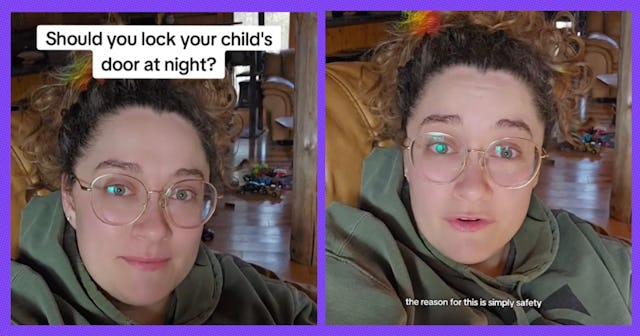A Sleep Consultant Has A Definitive Answer About Locking Your Toddler's Door At Night
Don't shoot the messenger.

When you think of the most terrifying things on earth — sky diving, world war, Costco on Sunday afternoon — one thing trumps them all: The day you move your toddler from a crib to a big kid bed. Yes, it needs to happen. No, you can’t keep them in a crib forever. Yes, you are unleashing a small person to roam free in your home at night if they so choose.
So, what are you supposed to do to make this transition work, especially if you have a kid who wakes up at night, wanders, or gets into any trouble they can find? Many parents are faced with doing something that seems bad or wrong: locking their kids into their bedrooms at night. And there’s a lot of back-and-forth on the internet about whether that’s a great thing or a terrible mistake.
Well. Certified pediatric sleep consultant and behavioral scientist Casey “the sleep witch” of @Littlelionsleep has a definitive answer that actually makes a good amount of sense.
“After six years at this job I have absolutely no doubt in my mind that you should definitely lock your child’s bedroom door at night when you move them from a crib to a toddler bed initially,” she begins her video. “The reason for this is simply safety. You want your child in a nice, safe location while you are asleep and unable to monitor them.”
The long and short of it? There are dangerous things in your home, but there’s not anything dangerous in your kid’s bedroom, so keep them in there at night.
“If your child is able leave their room, it’s not just that they can have bedtime drama and sleep issues, it’s that they can leave the room while you are sleeping and make poor decisions,” she continues. “Maybe that’s just a trip to your bedroom that results in a tumble and a fall. Or maybe they get distracted and get into something that they shouldn’t.”
And for parents worried about fire, she assures her audience that closing bedroom doors is actually recommended at night.
If you’re worried that locking a door will scar your kid emotionally, Casey also has something to say about that.
“Somebody is going to come at me and say, ‘it’s so traumatizing to lock your child in their room,’” she says. “You don’t have to make it traumatizing, we aren’t punishing them for bad behavior, we’re simply creating a large crib for them. They just got out of a tiny crib, that you kept them safely in for the first two plus years, and now they are moving to a giant crib with toys.”
She adds that while working her job, she’s heard of actual kids getting hurt because they were roaming the home at night.
“I’m also going to tack on one thing. In the six years that I’ve been a sleep consultant, I’ve seen two children who had to go to the hospital for ingesting something at night that they shouldn’t have,” she ends the video. “I’ve seen one that fell down the stairs trying to get to the kitchen and broke a collarbone. I’ve had one child getting a head injury doing something, getting up on a stool or sink at night. It’s just a simple safety decision to make.”
How can you safely lock your child’s room? Casey recommends a simple doorknob cover or installing your door knob backwards so that the lock is on the outside, facing the hallway.
In a follow-up video, Casey expanded on the cool idea that when your child leaves their crib, their room becomes their “giant crib,” and as such, it needs to be as safe and hazard-free as possible.
A few recommendations she shares? Hiding away cords, bolting any dangerous furniture to the wall, and putting drawer locks on drawers. Also make super-sure the windows are secure.
In a second follow-up, Casey responded to a lot of negative comments about what happens if your kid needs you.
Her answer is simple: keep your baby monitor in the room and be assured that your kid will let you know if they need you. Just because the room is locked doesn’t mean you can go in to soothe them when needed.
As always, different strategies work for different parents and different kids. But if your toddler is repeatedly leaving their bed at night since you replaced their crib, locking their room could be the best and safest way to make the transitions. You can also always talk to your pediatrician.